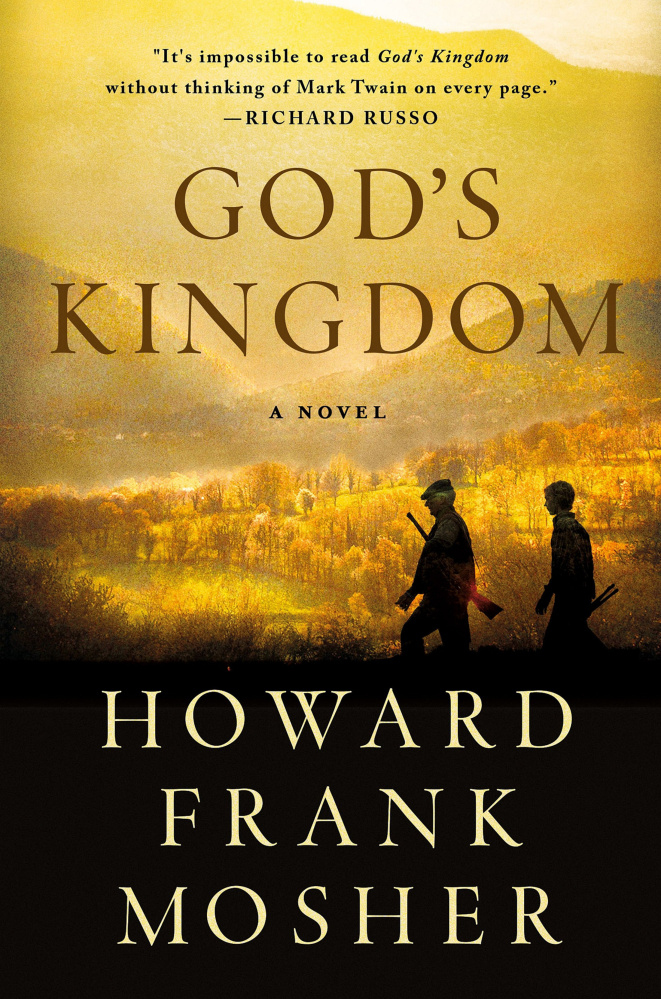Howard Frank Mosher is an old-school storyteller of the highest order. Story is of paramount importance to him, where place and character are seamlessly intertwined, each amplifying the other. His newest novel, “God’s Kingdom,” delivers a rich tableau of stories within a novel set in Vermont’s almost-mythical Northeast Kingdom, a region Mosher has long staked a claim to going back to his first novel, “Disappearances,” published in 1977.
“God’s Kingdom” turns around young James “Jim” Kinneson III, whose family settled the area in the 1700s. The story opens in 1952, with Jim newly turned 14 setting out with his grandfather, father and older brother on the family’s traditional post-Thanksgiving Day hunt. It is a day that Jim and his elders have long looked forward to – of his finally being of age to be “blooded” with the taking of a first deer. The surprise that ends this singular story indelibly fixes Jim in the reader’s mind like a promise the author holds to the very end of this poignant coming of age saga.
Family is fate in Mosher’s “God’s Kingdom.” Certainly to the Kinnesons. The family legacy of being fiercely principled is immortalized in stories that are handed down from the time of Charles Kinneson I, who returned to settle the region after the Revolutionary War, marrying an Abenaki woman “to do penance for killing the Indians” during the war. He built a trading post as well as a whiskey distillery that the family ran into the 20th century, the profits of which were used to start a newspaper that promoted the abolition of slavery, to fund schools in the South for freed slaves after the Civil War, and then later, ironically, to fund the campaign for prohibition. Jim’s grandfather – “Gramps” – was editor of the paper in his day, as is Jim’s father, Charles III, who won a Pulitzer Prize for his scathing editorials against Senator Joe McCarthy.
Mosher has a most beguiling storytelling style, leading with what first appears to be the setup for a touching or humorous yarn, then pivoting sharply into the shadows, if not entirely into darkness.
There are, among other stories, that of “Moose” Kinneson and his pet Moose, and “Crazy” Kinneson, the star of the local basketball team who can swish baskets with ease. But a deep undercurrent of racism runs with growing strength throughout “God’s Kingdom.” Mosher deftly sets this up from the first page. It wasn’t until after I finished the book and went back that I realized it was intimated even in the title of the first chapter: “Blooded.”
Three stories elevate “God’s Kingdom” into the realm of such American classics as “Huckleberry Finn” and “To Kill a Mockingbird.” Though Mosher’s protagonist isn’t as endearing as Huck or Scout, his novel is more nuanced and complex. Two tell the tales of a boy who becomes Jim’s best friend and a girl who becomes Jim’s lover.
The third is introduced off-handedly early on, through chapter epigrams lifted from “The Ecclesiastical, Natural, Social, and Political History of Kingdom County” by the Reverend Dr. Pliny Templeton. In addition to his writings, Pliny Templeton is woven into the historical narrative both as a minor character and as a specter of sorts in the science room of the local academy he founded. Readers come to realize in time that Pliny is not merely an anecdotal, historical prop, but is elemental to the entire structure and heart of the story.
In the end, “God’s Kingdom” is as much Pliny’s story as it is Jim Kinneson’s. It is the twining of their destinies that unlocks the darkest Kinneson family secret, what’s always and only vaguely referred to as “the family trouble,” or as Gramps confides finally to Jim, “a terrible stain on the family.” At that point in the story, not even Gramps himself knows the full story, as he would certainly have chosen different words to describe it had he known the whole truth.
Mosher’s storytelling gifts are many, including a kind of literary sleight of hand. He begins to tell a certain type of story but slowly lifts the veil to reveal it as something completely more vexing. A story without pretension, “God’s Kingdom” leaves the reader marveling at how he does it.
Send questions/comments to the editors.



Success. Please wait for the page to reload. If the page does not reload within 5 seconds, please refresh the page.
Enter your email and password to access comments.
Hi, to comment on stories you must . This profile is in addition to your subscription and website login.
Already have a commenting profile? .
Invalid username/password.
Please check your email to confirm and complete your registration.
Only subscribers are eligible to post comments. Please subscribe or login first for digital access. Here’s why.
Use the form below to reset your password. When you've submitted your account email, we will send an email with a reset code.